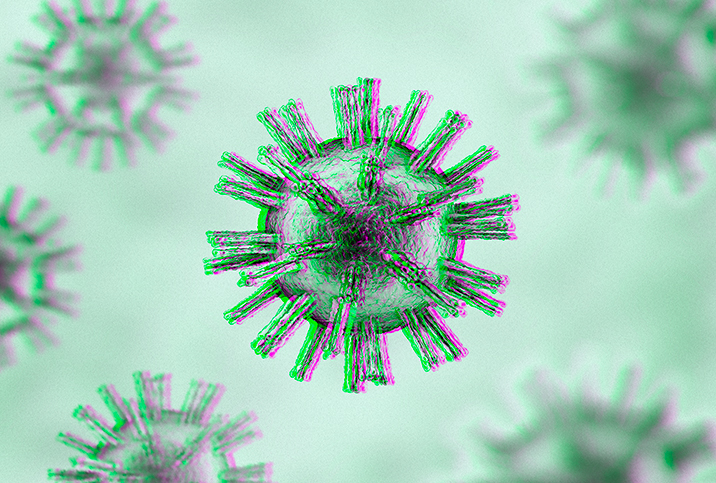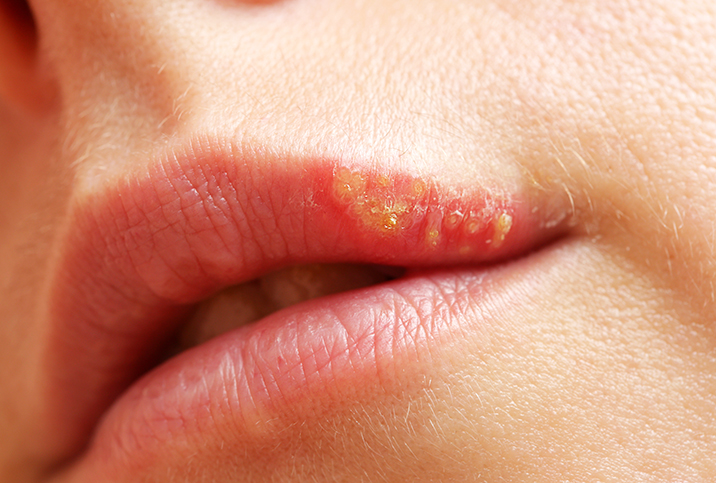Here's What a Herpes Outbreak Looks (and Feels) Like

Herpes has been compared to house guests who won't leave. But at least when those can't-take-a-hint squatters leave, they're gone, whereas herpes, even when not intrusive, lingers.
Split into two categories, the herpes simplex virus affects the mouth (HSV-1, or oral herpes) and the genitals (HSV-2, or genital herpes). Both types are common, both stay in the body for life, but both are equally manageable.
All herpes outbreaks progress through five stages. The first stage takes one of two forms: a primary first outbreak or a nonprimary first outbreak. The difference is a primary first outbreak occurs in someone who has only now acquired herpes; a nonprimary first outbreak occurs if an individual acquires a second type of herpes. This primary outbreak is typically the most severe, with potential full-body, flu-like symptoms including a fever or chills, fatigue, aches and a headache.
The primary outbreak gives way to temporary dormancy, after which a recurrent outbreak eventually follows. Recurrent outbreaks are typically less severe than first outbreaks and are most frequent in the first year, after which many cases lay dormant for long periods of time between flare-ups.
Three stages comprise recurrent outbreaks, regardless of the strain of herpes: the prodrome stage, the blister/ulcer stage and the healing stage.
The prodrome stage
The preliminary phase of a herpes flare-up may not affect everyone.
"There may be what is called a prodrome prior to the onset of the outbreak," said Laura Purdy, M.D., a Brentwood, Tennessee-based physician offering telehealth services with Push Health. "Not everyone may experience it, and not everyone who experiences it may experience it every time. However, it is possible and a fairly common experience to feel a little bit of numbness or tingling in the area in the days immediately prior to the outbreak."
Purdy mentioned about half of all individuals with herpes experience a prodrome stage. The virus is not visible or active in the form of skin issues just yet, but its presence along nerve endings leads to feelings of itching, numbness or tingling in certain areas. Individuals with genital herpes may also feel buttock and leg pain.
Other potential prodrome symptoms include swollen glands, fever, body aches and flu-like effects, said June Gupta, N.P., the senior director of medical services at Planned Parenthood Federation of America.
Despite the prodrome stage not being present in all cases, with its indicators being varied, it remains a reliable warning sign of an upcoming outbreak for people who experience it. With each passing recurrent outbreak, personal indicators become more familiar. Addressing the prodrome stage through medication within the first 72 hours of noticing symptoms can expedite an outbreak's end, potentially shortening its duration from weeks to a few days.
The blister/ulcer stage
During the second stage of an outbreak, signs become visible to the naked eye, specifically in the form of blisters.
"The cluster of blisters, which we call vesicles, may enlarge over the first couple of days of the outbreak," Purdy said. "Improvement is monitored by resolution of the blisters, which will generally crust over. [One test for herpes is] to unroof an active blister and swab it for a viral culture, which will grow the virus if it is present."
"Unroofing" is the medical euphemism for picking at your scabs, and a vesicle is a technical term for a fluid-filled cyst. These pus-filled blisters appear as patches of either red or white bumps and are painful. Unroofing should only be done by a medical professional in a sterile location, because bothering these bumps can extend the flare-up, lead to scarring and potentially more easily allow spread to partners, with exposure.
The main difference between the blister stage and the stage that follows is that blisters have not yet burst into open wounds. Once your blisters have turned into bleeding or oozing sores, called ulcers, you're in the penultimate stage of a recurrent outbreak. The virus is currently at its most contagious, so practicing good hygiene and protecting the wounds is especially vital. After having any contact with the ulcers, it's imperative to thoroughly wash your hands to prevent spreading the virus to other people.
The ulcer stage differentiates between first outbreaks and recurrent ones. It's possible for the virus to spread to other parts of your body during the first outbreak. During recurrent outbreaks, however, your body will have developed the necessary antibodies to prevent spreading. After the initial outbreak, the likelihood of developing the same type of herpes in a different spot plummets.
The ulcers' pus or blood eventually forms a crust; this is the first indicator that healing is around the corner.
The healing stage
Herpes sores on or around the genitals may require a week to a month to heal, but when they do, it's a watershed moment.
"When there is no longer a blister, it is generally presumed that the patient is not actively contagious from those lesions," Purdy said. "[The blisters] no longer contain fluid before the redness will resolve. Technically, when the blisters have resolved, the outbreak is over, but the body needs to heal the inflammation. It may take a little bit longer for all of the skin to heal, but this is more of a recovery phase rather than an active outbreak phase."
Scabs fall off on their own, but your body may still experience the effects of the outbreak even if you don't feel them, so protect your weakened immune system and diligently maintain hygiene. Anything that challenges the immune system can potentially trigger an outbreak. Stress or other infections and illnesses may exacerbate flare-ups.
Asymptomatic shedding is also possible anytime between outbreaks. The virus sheds from the skin and can be transmitted to other people through skin-to-skin contact even when no visible symptoms are present.
Fortunately, herpes infections primarily manifest at the site of the infection and may even manifest as asymptomatic infections that are only revealed once a blood test indicates a person possesses antibodies to herpes, which can only develop in the body from exposure to the virus. Herpes is often stigmatized, but it's a common virus and outbreaks typically become milder and milder. As long as sexual hygiene is maintained, medications can reduce the outbreaks.


















